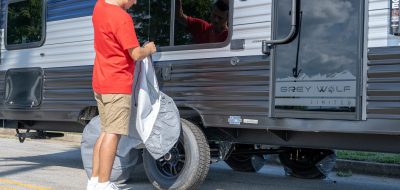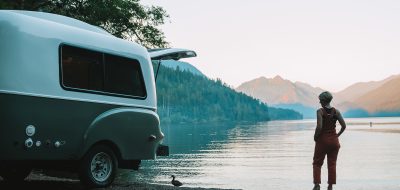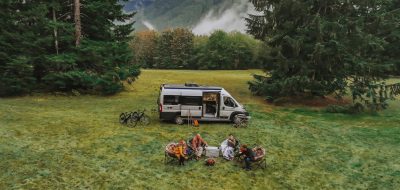By Paula Loehr, R.N.
Until last spring, renting a recreational vehicle was not on my family’s to-do list. We really didn’t need to consider it. My husband Dennis and I have owned RVs of one type or another since the early ’80s, when our first child was born. Pop-ups, a travel trailer and two motorhomes have served us as roadworthy second homes for as long as we care to remember. None of us can imagine our driveway without an RV parked in it.
Apparently, my family of five is not alone in our enthusiasm for RVing. The Recreation Vehicle Industry Association (RVIA) estimates that more than 8 million American households currently own an RV. As for prospective owners, more than one in six US residents who have never owned an RV say they would like to buy one in the future. When you consider that there are 16,000 public and privately owned campgrounds nationwide, the possibilities for RV adventures seem almost endless.
If you factor in the statistics for folks who rent RVs, the number of Americans with an interest in RV camping totals 30 million. In fact, the RVIA reports that the recreational vehicle rental business is a thriving $350 million industry, with 460 outlets in the United States alone.
My family’s initial interest in RV rentals came about when four of us decided to spend July 2010 camping in Australia. Renting was our only practical option, since our current Class B RV couldn’t possibly travel Down Under with us. Our oldest son Ross (who had camped in Australia three times before), convinced the rest of us that renting a motorhome was the only way to go. So we set out to do just that.
As compared with camping in the United States, touring internationally in a motorhome certainly differs in lots of ways. However, from a big picture perspective, the essential RV ownership versus rental experience is much the same, no matter where you travel.
Here’s what our recent RV rental taught us about owning/renting pros and cons.
Plan Ahead.
As with any camping excursion, a trip taken in a rental RV requires plenty of advance planning. Ask for recommendations from other RVers to find a reputable rental company. Be sure to familiarize yourself with your chosen company’s rules and regulations, particularly in the areas of reservation deposits, assessed fees, mechanical breakdown policies and reimbursements for cancellations. Print out a copy of the entire rental agreement. Keep in mind, too, that a last-minute switch of vehicles (in which the RV you ordered becomes unavailable and is replaced by an alternate rig) is a possibility.
Orientation 101
As an RV owner, you’re comfortably familiar with your rig’s assorted features, size, shape and functions. But the learning curve is steep when you’re orienting to a totally unfamiliar rental rig. Fortunately, RV rental companies recognize this fact, so they offer renters helpful advice, hands-on instruction and supervised test drives to promote safety and confidence.
RVing is RVing is RVing
There are lots of common expenses built into the camping experience, whether you’re traveling in a purchased RV or a rental unit. For example, the costs of food, fuel and overnight camping are essentially the same for owners and renters of similar RVs.
Considering Cost Effectiveness
RV ownership is a major financial commitment, no matter how you approach it. It usually begins with an initial down payment or cash sale, followed by somewhat predictable ongoing costs such as loan payments with interest charges, maintenance/repair bills, insurance premiums, and seasonal storage fees.
While RV rental expenses are substantial, they are self-limiting. Early reservations generally result in optimum rental rates, and special discounts are available, too, so remember to ask for them. Prices vary, based on geographic location, season and general demand. Reservation down payments, security deposits and general rental fees are standard. Extra fees related to taxes, reservation changes, actual mileage driven, generator use, one-way drop fees, late return fees and such are added. Proceed cautiously by reading the entire contract before signing. On the favorable side, your financial responsibility for a rented RV stops when your contracted time frame ends.
Only you can do the appropriate math to determine whether RV ownership or rental is your best individual course of action.
Playing the Field
Before you take the plunge into RV ownership, it’s sensible to sample a variety of rental rigs of all types, styles and sizes. A series of diverse rentals might help you identify the ideal rig that you want to purchase someday.
Here, There and Everywhere
How far you want to travel and how long you want to stay on the road can also help determine whether you should purchase or rent an RV. If your long-range plans call for lots of long-distance travel and extended stays on the road, chances are RV ownership is right for you.
One advantage of renting an RV is the ability to secure a one-way trip reservation, with vehicle pick-up at one location and drop off at another. Inquire about one-way drop-off fees, which are sometimes prohibitive, before you sign an agreement.
RV Sweet RV
Signature touches are what turn the rig that’s registered in your name into a one-of-a-kind hideaway. Customized features, from handcrafted coffee mugs to a state-of-the-art sound system, to your family portrait on the refrigerator door, encourage the sense that you’re really at home in your RV. Although rental units are generally cozy and decked out with all the latest conveniences, they lack the personalized appeal that comes with equipping and decorating your RV just as you like it.
Who’s in Charge?
Let’s face facts. Ultimate freedom and flexibility come when you hit the road in your own recreational vehicle. You can choose where to go, when to go, and what to do without paying too much attention to your calendar. Except for the looming rig return date, a high degree of open-ended fun is all yours in a rented RV, as well.
Insurance Assurance
When it comes to RV insurance, a little research goes a long way. If you’re renting an RV, ask your standard auto and/or RV insurance policy provider if your current policy adequately covers an RV rental. If additional vehicle insurance is recommended, it can usually be obtained through your RV rental company or your standard insurance agent. Optional coverage’s offered by large rental companies such as Cruise America may include expense reimbursements for mechanical breakdowns, payments for accidental damage to a rented vehicle, and/or supplemental liability insurance.
Packing Options
It’s important to ask your rental company if kitchen supplies and linens are provided for free, for a fee, or not at all. You probably don’t want to pack duplicates of items already available in a rental rig, but neither do you want to discover (at bedtime or dinnertime) that there are no sleeping bags, pillows, kitchen pans, dishes or utensils in your closets and cabinets.
Keeping Things Ship-Shape
Simply stated, you’re responsible for everything, including all kinds of maintenance, when you opt for RV ownership. In case of a mechanical breakdown, a safety net such as Good Sam Emergency Road Service can help keep you confident, secure and rolling down the road.
RV rental companies generally provide 24-hour emergency assistance, as well. Ask about it up-front. Renters are responsible for routine maintenance that’s required while traveling, such as fluid level inspections, tire air pressure checks, fuel tank fill-ups, general cleaning, and, of course, holding tank emptying at the close of the trip.
Planning for Pets
There’s no debate about your pet hopping aboard if you own an RV, but is a pooch or kitty welcome to join the family fun in a rental motorhome? That depends on the individual company, so research with care if your pet is a member of your RV rental party.
Tow, Tow, Tow Your Boat
You can tow whatever your dare (and whatever’s legal) with an RV that you own. But what’s the towing policy for rental establishments? Just as with pets, towing regulations vary by company. Cruise America allows towing (with weight restrictions) on motorhomes equipped with receiver hitches, but customers must provide their own tow bars. Daily towing fees apply, but insurance coverage related to towing is not provided.
Are There Exclusions?
Here’s a word to the wise … When preparing to sign an RV rental contract, read all the fine print, and read it again. The remote area of Alaska that you want to explore or Manhattan’s sparkling cityscape might be out-of-bounds, depending on the rental company you choose. So ask pertinent questions about off-limit roads or regions before you complete your contract.
Public Perceptions
How does John or Jane Doe view an RV owner versus a renter? If our interactions with Australian travelers can be generalized to Americans, there’s a heightened sense of curiosity about campers who are renting. For example, if your RV bumper or windshield features your rental company’s logo and website, you can expect a heaping helping of rental-related questions. “How much does it cost?”, “How far are you traveling?”, and “May we please see the inside?” were common queries we received. While we also meet inquisitive people when we’re driving our own Class B back in the States, it seemed like the numbers of RV-interested parties soared when we took to the Australian roads in our rented KEA motorhome.
After many years of RV ownership and one very positive rental experience, my family’s view is that RVs are a wonderful way to travel, no matter how you obtain them. While we’re likely to remain RV owners for a very long time to come, we applaud rentals as great alternatives — for new RV enthusiasts, for those who plan an occasional short camping trip, for former RV owners who haven’t purchased their new rigs just yet, and for RVers who like to camp internationally.
For more info about RV travel visit the Good Sam Club Trip Planning section where you can route your RV trip, read interesting RV travel articles, learn about points of interest, find RV campgrounds and print out RV checklists.





MARIO
Fairly good info , could have been more elaborate perhaps or wish more info. But pretty good coverage & info overall. thank you for posting.
Pam Stone
Finally, some place I can share our RV story! I feel VERY strongly & recommend wholeheartedly to rent first-find out what you like & don’t like! The size,kind,&conveniences you need! Think about where you want to go & how much time you will have. What time of year you will be traveling. My husband & I bought a fifth wheel without ANY experience in our family or our family’s experience when we were growing up! We knew we wanted something MORE than camping in a tent as our boys were growing up & RV’s looked so COOL! The place we bought ours from just wanted to sell one-especially when we had cash! The introducting learning class was a fifteen miniet JOKE! Now we have a fifth wheel we have taken out maybe 5 times-mainly to campsites by indian casinos that we like to do in the 6 years we have own it! It’s beautiful inside but we know now that it doesn’t even have enough insulation in it to travel in the winter plus my husband is not retired so he’s workung LOTS of overtime to keep this fifth wheel in good condition sitting in our side yard!! It works real well for wrapping christmas presents that we get our 11 grandchildren! So please think-and rent to experience all you would like!!!
Paula
Sharon,
You and your husband are just a few short miles away from experiencing the countless wonders of RVing. Driving an RV is just like any new venture… Practice is the key to success. First things first. Begin your journey into RVing by making arrangements to have your rig checked out (from bumper to bumper) by a reputable RV service center near your home – to make sure it’s totally roadworthy. Ask for insider tips about driving while you’re there. At twenty feet in length, your rig is an excellent size for a driver who’s new to RVing. When my husband and I bought our first motorhome, we went to a local school parking lot (on weekends when no one was there) where we practiced the basics of driving, turning, backing up and parking our RV. We returned for several leisurely, no-stress driving sessions – until we both felt comfortable and confident behind the wheel. If you feel like you need additional help to learn how to drive your rig, you are in good company . For this very reason, there are RV driving schools operating all over the USA. You can ask your RV service center rep for a recommendation or search online for an upcoming RV driver training session at a location near your home. I urge you to get started as soon as possible. There’s no time like the present to embrace the joys of RV camping.
Sharon
We were given an old RV which we got fixed up for big bucks, which my husband drove back and forth to the repair shop. Other than that it’s only been used as a spare room for guests. The problem is, I’d really like to travel in it, but both of us are afraid to drive it (it’s 20′ long). Can you suggest anything that might help us get on the road confidently? Thank you.